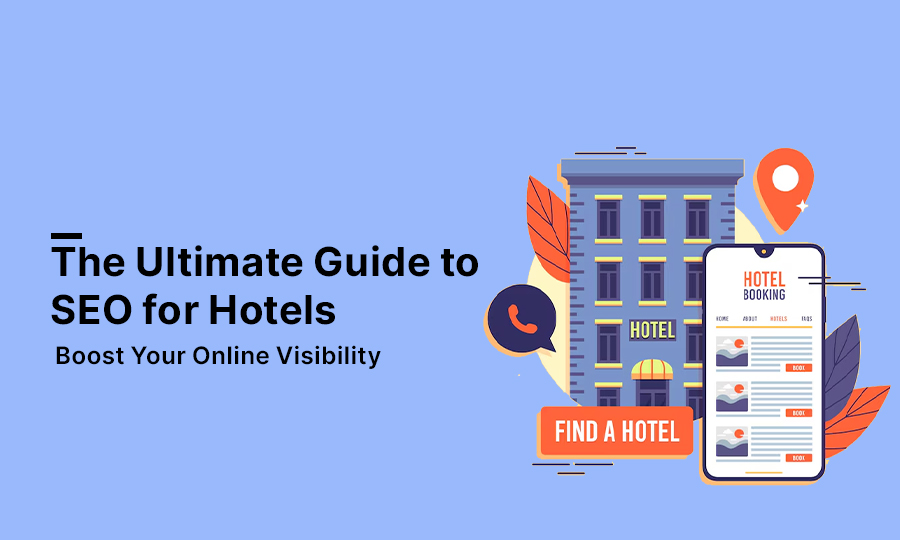As per research conducted by none other than a leading search engine, Google envisages that search engines witnessed its increased use by 92% users for searching hotels. It also reveals that 90% of travelers prefer to research online and 82% complete online hotel booking. It increases the significance of SEO for hotels.
The above stat reflects that SEO for hotels matters a lot in drawing the attention of travelers. So, if you get fewer booking queries, it’s time to boost the search engine ranking of your hotels to ensure they appear on top in search engine result pages (SERPs).
Doing SEO on your hotel’s website by implementing the right strategies and ongoing trends will help you improve its search engine ranking. It helps you get more queries for bookings.
The post serves as a complete guide to SEO for hotels. It discusses exclusive search engine optimization strategies for hotels. Let’s delve into the basics first.
What is SEO for Hotels? A Brief Introduction
SEO for hotels is the techniques that serve their ultimate purpose to boost the search engine presence of hotels, which leads to lure more potential customers. The technique involves various important activities such as improving website speed, keyword optimization, creating backlinks, engaging content, etc.
To make search engine optimization more effective and result-oriented, you need to target high-volume keywords with low competition. It helps you improve the ranking of your website in less time and you will start getting results. Using long-tail keywords should also be in your search engine optimization strategy.
Why is SEO for Hotels Important?
Well, SEO is important for hotels for many reasons like increasing website traffic, and bookings, and thus helps you stay competitive. Once you become successful in improving the search engine visibility of your hotel website, it helps you discover people who may be interested in booking your hotels. They can easily come across your hotels while searching online.
A properly optimized website helps you keep your hotels stand out and gain a competitive advantage. All you need to do is target relevant keywords and enhance your local search presence and user experience.
An effective search engine optimization is essential to build trust and credibility in your hotels and thus helps you enjoy getting more bookings.
How to Do SEO for Hotels? Explore Various Useful Tips and Tricks
Before you proceed with SEO for hotels, you need to have a solid plan and ensure its proper execution to move in the right direction. It’s also necessary to follow various tips and tricks to make your SEO efforts result-driven.
- Be Aware of Your Target Audience

No matter how powerful your SEO strategy is, you will not get the result unless you don’t have an idea about your target audience. You can explore details about the types of guests you wish to target. Whether you wish to target families, professionals, solo travelers, or honeymooners, you need to be clear about it.
After getting a clear idea related to your target audience, you can now tailor your keywords, content, promotional efforts, etc., to match their requirements. For instance, if you target families, you can offer lucrative deals for family vacations.
If you are not sure how to proceed to gather details about how to find out your target audience, you can leverage Google Analytics. It helps you gather information regarding your target audience in terms of their preferences, demography, online behavior, etc. Getting social media insights will also help you in this.
- Optimize your Websites for SEO
You need to optimize your website properly for search engines to boost its online visibility and thus get more queries for bookings. Besides, it also creates a first impression on your guests. So, it should be eye-catching as well as quick loading speed.
You need to follow all the latest practices for SEO for hotels industry to optimize your website properly. Besides, you can follow the below-provided tips as well.
- Create unique and descriptive meta descriptions for your hotel’s website.
- Create a unique title that can appeal to users at the first glimpse. For instance, you can create a ‘Luxury Hotel in Agra for Unforgettable Stay’

- You need to optimize every image properly with ALT text. It’s essential for a better search engine ranking.
- Once you have a list of all keywords that you wish to target, you can now use them properly on your website.
- Keep URL structure short and SEO-friendly. The reason is a long URL structure confuses Google and thus affects your search engine ranking.
- To improve the safety of your website, you can implement an SSL certificate.
- Broken links are the biggest hurdles in search engine ranking. So, you should fix the same as soon as possible.
- Interlinking is one of the core criteria of search engine ranking, you should do it properly.
- Do Google Businesses Listing
Local SEO is one of the most crucial parts of search engine optimization, which helps your website be visible in local searches. So, it’s advisable to list your hotel’s website in Google Business Profile to gain the advantage of Google’s Local Pack.
It’s advisable to ensure the name, address, contact details, etc., of your hotels are correct. Never forget to use top-quality images of your hotels and rooms. You should request your guests to leave reviews on your Google Business profile.
Besides, positive reviews can definitely improve your local SEO rankings and thus captivate a large number of guests.
- Perform a Thorough Keyword Research

Keyword research is one of the most crucial aspects of hotel search engine optimization and also determines its success. Keyword research is a practice that relates to finding out the relevant search terms used for finding hotels.
There are several tools you can leverage to find the right keywords that you can use in your hotel SEO strategy. You can use free tools like Aherfs and Keyword Planner. Besides, you can also use SEMrush, which is free with only limited features.
With the help of the above tools, you can find the relevant keywords for your hotels. Implementing these keywords will help you get more traffic to your website. While searching keywords, you need to focus mainly on ‘location-based keywords’, ‘service-based keywords’, and ‘booking intent keywords’.
Understand User Intent Before you Proceed for Keyword Research.
Well, according to SEO experts, users don’t always search for any products or services for buying purposes. They do it with different intents that are as follows;
- Informational: Users sometimes search for any products and services just for informational purposes. For instance, if your hotel is located in ‘Agra’. In this case, there’s the possibility that your target audience may search for ‘things to do in Agra’.
- Decision-Making: Users sometimes gather more information thoroughly before they commit to making a final decision about getting any services. For your case, they might look for ‘top budget hotels in Agra’.
- Buying: In this case, users search with the main intent to buy the service they wish. For your case, they may search for ‘Budget-friendly hotels for family’
- Navigational: In this, users seek to navigate some specific parts of the website and Google search makes it convenient.
What Should You Consider While Selecting Keywords for Your Hotels?
For this, you need to understand your potential customers better in terms of needs while searching for accommodation in your locations. It’s advisable to keep in mind the core features and characteristics of your hotels while selecting the right keywords.
Let’s explore all those things you can consider to implement in your keyword selection strategy.
- You need to be familiar with those terms that travelers use to describe your hotels. It’s advisable to target those terms appropriately while selecting keywords.
- You should understand several reasons why people seek to travel to the location where your hotel is situated.
- You should also be familiar with and target those activities that people wish to engage in your location.
- You can also target those things that people like about your property the most.
- If any extra services your property offers, including wedding ceremonies, business conferences, spas, etc., you can also target these things while selecting keywords for your hotel.
Short-Tail Keywords vs Long-Tail Keywords? Which are the Best for Hotel SEO?
There are two important types of keywords – short-tail keywords and long-tail keywords. When it comes to short-tail keywords, they are a combination of 1 to 3 words. For instance, hotels in Agra’.
Short tail keywords have the highest search volume and also huge competition. In other words, ranking on these keywords can indeed be tough. These keywords are important to attract general traffic. You can’t expect conversion from these keywords.
On the other hand, long-tail keywords are specific phrases. It consists of 4 or more than 4 words. For instance, couple-friendly hotels in Agra’. These keywords have the lowest search volume and less competition.
These are effective in targeting relevant audiences. It increases conversion rates. Long-tail keywords give you an idea about what your target audience wants, whether it’s any specific locations or amenities.
While doing SEO for hotels, you can focus on long-tail keywords. These keywords have the lowest competition level. So, there’s a higher chance for you to rank with these keywords and thus capture the niche market. It thus helps you generate more qualified bookings for your hotels.
To get better results you can use the combination of both long-tail and short-tail keywords.
Right Strategies to Use Keywords
Once you select the keywords for your hotels, you can now make a clear strategy to use them properly. You can divide your keywords into two important categories – primary keywords and secondary keywords.
The primary keyword is the main keyword. Google recognizes your page through this keyword. So, you need to leave no stone unturned to rank your page with primary keywords.
Make sure you select the keyword that has a higher search volume as your primary keyword. In other words, these keywords are highly competitive.
The content for the entire page of your website should be created based on the primary keyword. Top examples of primary keywords include ‘Agra Hotels’, and ‘Hotels in Agra’.
Secondary keywords are subsidiary keywords of your primary keywords. These are keywords that indicate someone’s search before making a final decision. Your potential customers may desire to know the facilities and amenities your hotel includes.
For instance, your target audience may seek to know whether your hotel is family-friendly, pet-friendly, etc. So, your secondary keywords should include various facilities and amenities that your hotel offers.
Keyword Optimization by Types of Rooms
Optimizing keywords by the type of room is indeed the right strategy you can follow. Your hotels may have different rooms like family, deluxe, and budget rooms. So, it’s indeed a great strategy to optimize content for every type of room to get the desired outcomes.
Guests always search for specific accommodation options like ‘affordable rooms for family’ or ‘luxury rooms near Isckon Temple’. Therefore, it’s indeed a good idea to create a separate page for every type of room available in your hotels and optimize them with the use of the relevant keywords. These will boost your chance to rank high in SERPs.
- Optimize your Website Content
Your SEO strategy will not drive results unless you create quality content. Not to forget ‘content is king’, especially when it comes to the hotel industry. So, you should never leave any stone unturned to create relevant, high-quality, information, and interesting content. It can indeed boost your hotel SEO.
It’s a good idea to create content for your hotel’s website based on a question/answer form. Be it room descriptions, blogs, or landing pages, every type of content has its relevance. Therefore, you need to focus equally on creating them.
How to Ensure Relevancy of Content
You need to ensure that your website includes informational and valuable content. If you are unsure, you can check whether or not the content matches the following criteria.
- Trustworthiness
Google prioritizes only trustworthy content, which is also essential to increase the credibility of your website. So, it’s necessary to use resources wherever required. Make sure your content is updated. For instance, you can write any event that takes place every year. It’s essential to update your blog every year during the event.
- Relevancy
You need to check whether or not your content matches properly with user intent. To do this, it’s advisable to select a keyword as a topic and elaborate it in-depth. Doing this helps you cover different bases and thus makes you quite relevant.
- Uniqueness
Unique content can help you a lot only in SEO for hotels. You should not follow the practice of copy and paste. Of course, you can get inspiration while creating content for your website. Always keep in mind that Google penalizes duplicate content.
- Authoritativeness
Make sure you create content for your website in-depth and also with various necessary details. Your content should be perfectly researched. Your content should answer all important questions that users most commonly ask. Meanwhile, there are several queries that need more content compared to others.
- Easy-to-Read
Your content should include simple language. So, users can understand everything clearly. Your content should load quickly, look perfect, and should be fully digestible.
- Create Impressive Page Title, URL, Meta Description
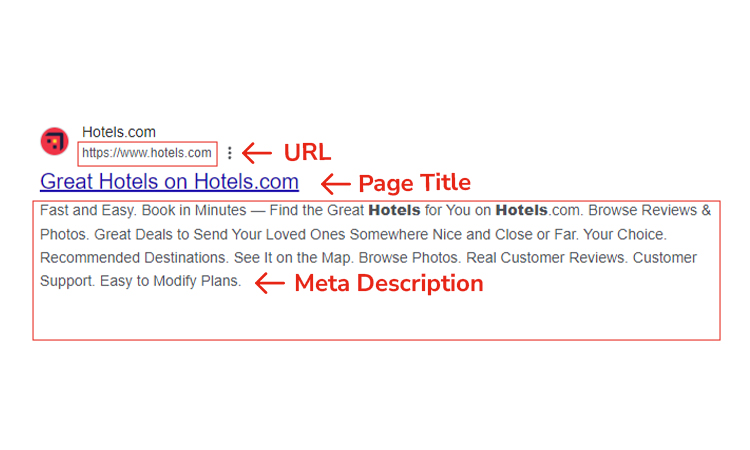
Be it URL, title, or meta description, everything has its relevance in search engine optimization. Make sure every page of your website has a unique and eye-catching meta description, URL, and title.
It’s necessary to use your targeted keywords to optimize them properly. These elements allow search engines to get a complete understanding of the content and also enhance your click-through rate by ensuring your listing is highly attractive to users.
To make your page titles SEO-friendly, you can keep them between 50 to 60 characters. Make sure it includes your primary keyword. URLs of your website should be short, keyword-rich, and highly descriptive.
As far as meta description is concerned, you can offer a concise and interesting summary of the page content and also include a call to action.
- On-Page Optimization
When it comes to on-page search engine optimization, it’s a process that involves optimizing every single page of your hotel’s website. It’s indeed useful in enhancing their overall rankings. It includes many activities that are as follows;
- The use of internal linking is important as it sends users to other pages of your website.
- Google always prefers well-structured content including different headings like H1, H2, and H3 by including heading tags and also appropriate keywords.
- Keyword placement is something that indeed keeps a great relevance. You can use your targeted keywords naturally in the content. You should always avoid keyword stuffing.
- Off-Page Optimization
When it comes to off-page SEO, it indicates those actions that you take outside your website to boost its ranking. You can concentrate on creating top-quality backlinks from those of reputed websites. You can implement the following practices to create backlinks.
- Write more reviews for your hotels. You can get in touch with influencers and bloggers for this purpose.
- Do list your hotels on many popular sites like Booking.com, TripAdvisor, Expedia, and others.
- Engage yourself with local partnerships like event organizers, tourism boards, etc. They will help you gain backlinks.

- It’s the most preferred idea to collaborate with travel bloggers, local tourism boards, event organizers, and many others. They will help you create backlinks from many reliable local sources.
- Guest posting is indeed the most reliable way of earning backlinks from reputed websites related to your horizon.
- Social media promotion of content available on your website also helps you gain potential backlinks, apart from increasing its visibility.
- Optimize Images with ALT Texts
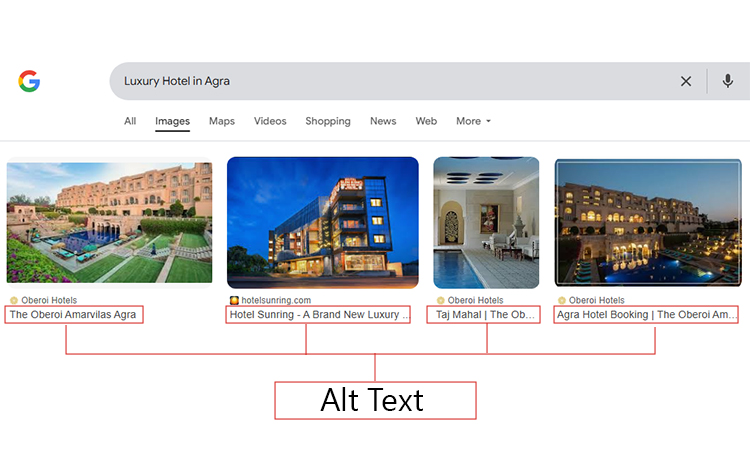
Images play a vital role to tantalize the sense of guests and encourage them to book your hotels. Apart from using cajoling images, you can use ALT Texts to optimize them for search engines as well. It’s essential to enhance the ranking of your images in image search results.
While optimizing your images, you should never forget to implement your targeted keywords. Don’t make it keyword-stuffed rather it should be natural and descriptive.
- Local SEO for Hotels
As mentioned above, local search engine optimization is pivotal. The main reason is people often search for hotels in particular locations. So, optimizing your hotels in some specific locations definitely yields amazing results.
It’s advisable to list your hotel’s website in Google Business Profile to gain the advantage of Google’s Local Pack.
You need to ensure the name, address, contact details, etc., of your hotels are correct. Never forget to use top-quality images of your hotels and rooms. You should request your guests to leave reviews on your Google Business profile.
Besides, positive reviews can definitely improve your local SEO rankings and thus captivate a large number of guests. We already mentioned above about listing the name, address, and contact information of your hotels on Google.
You need to maintain consistency of this information across all online listings. The next thing you can do is to list your hotels on many travel websites and local directories.
It’s advisable to use location-based keywords, be it for meta tags or content. The most important thing to do is to implement a schema. It enables search engines to highlight the business details of your hotels, including ratings and reviews in SERPs.
How to Make Your Local SEO Effort Effective?
To make your local search engine optimization more effective and result-oriented, you can keep in mind the following important things;
- Respond to reviews without taking so much time
- Answer questions immediately
- Always display top-quality images
- Make sure the message is enabled
- Highlight every important element of your business
- Make sure you present crucial information to display
- You can link where guests seek to make a booking
- Make sure you implement keywords properly to rank in local SEO
The most important thing you can keep in mind is that Google focuses on those sections of your profile that users search. But, you need to provide enough content and required information to help Google work. You can do it here in the same way you do for your website.
These are something that gives users a genuine reason to rely on you. Timely responses and reviews easily appear on your profile and thus help you stay on top of these to get a great impression.
- Technical SEO for Hotels
Technical SEO for hotels is necessary to structure your website as per the search engine optimization guidelines. It helps search engines crawl your website properly, which leads to indexing every page and content.
To do technical SEO, the first thing you can do is to create an XML map of your website and submit it to Google. You can use Google Search Console to submit it. The use of Robots.txt is essential to give search engines a direction in terms of which page needs to crawl and which one does not.
The next thing you can do is to minimize the possibility of duplicate content by using canonical tags. Using 404 error pages is necessary to ensure that users break links or delete pages with certain navigation options.
- Do SEO by Amenities and Activities
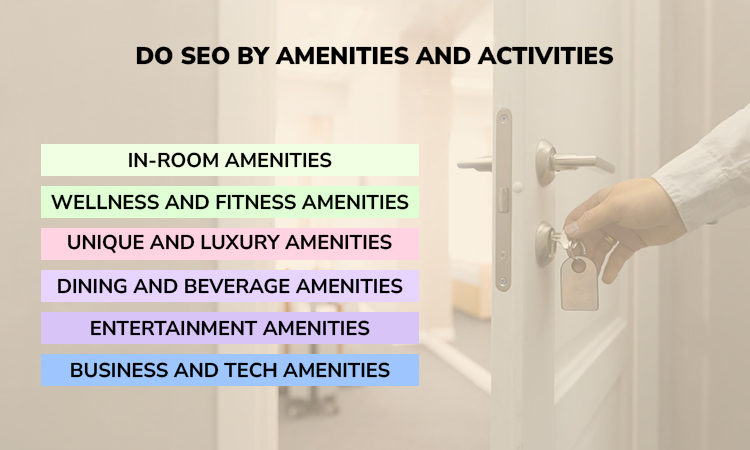
When it comes to amenities and activities, these are indeed some of the things that most of the guests always take into account while choosing hotels for bookings. Therefore, you can optimize the content of your website by including all amenities and activities.
It helps you improve the search engine ranking of your website and also catches the attention of those who are looking for these amenities while booking hotels. To include amenities and activities, you can consider the following strategies.
- You can do keyword research related to both activities and amenities. For instance, ‘hotels with free parking’ or use similar keywords.
- It’s also a good idea to create a separate page for all amenities and activities by using a specific keyword. It maximizes your chance to rank high with a niche search.
- You can also include top-quality videos, images, virtual tours, etc. to highlight your amenities. Always keep in mind travelers have great preferences for visual content and search engines give preferences only to those websites that are capable of delivering the finest media experience.
- Make your Website Mobile-Friendly
We all are aware of the fact that Google gives an edge in search engine ranking to those websites that are mobile-friendly. So, make sure your website is mobile-friendly. If not, you need to first make it mobile-friendly and then proceed with SEO.
You can understand that the majority of travelers browse hotel websites with the use of their mobile devices. As mentioned, Google always prefers those websites that are mobile-friendly. You should make sure your website is highly responsive across a range of devices. It helps you stay competitive.
- Improve the Loading Speed of your Website
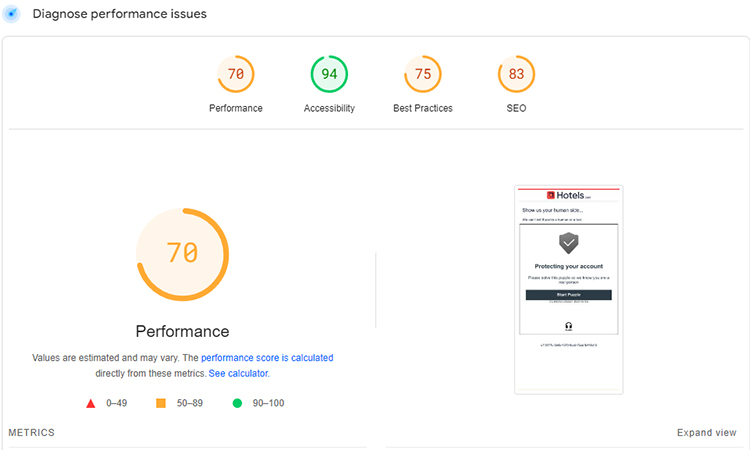
We have already explained how the loading speed of any website is vital to improving the search engine ranking of your website. A slow website impacts adversely on user experience. On the other hand, those websites that load fast can often minimize bounce rates and thus increase their chance of converting visitors into guests.
To improve the loading speed of your hotel’s website, you can first compress all images available on your website. You can use many popular tools to compress images, including ShortPixel, TinyPNG, etc. These tools promise to help you compress images without affecting their quality.
The next important step should be to enable your browsing caching to minimize the overall loading times for returning visitors. Apart from this, you can also take some other measures like minifying CSS and JavaScript. Using a content delivery network (CDN) can indeed be the right option for you.
- Create and Submit your Sitemap
Google can crawl your website properly only if it’s familiar with the structure of your website. A sitemap of your website allows Google to understand the structure of your website and thus encourage crawling every page and post.
So, it’s mandatory to create a sitemap of your hotel’s website and then submit it to Google Search Console, which we already discussed earlier in this post.
You will certainly not find any kind of difficulty when it comes to creating a sitemap for your website. There are several tools you can leverage to do it effectively. Yoast SEO is one of those.
- Enhance Google Hotel Search
With Google Hotel Search, users get an option to do an effective comparison of hotels based on reviews, rates, etc. After comparison, they can book hotels directly from search result pages. So, you can optimize your listing on Google Hotel Ads, to maximize your reach among your potential guests. It helps you improve your SEO.
All you need to do is to include the best and most competitive prices and update the same regularly. You need to understand that Google compares your prices with many other listings. So, those hotels that have the best prices appear at the top of search results.
It’s indeed mandatory to use top-quality descriptions, images, and a complete list of amenities in your Google Hotel search listings. These will help you entice more clicks and conversions.
- Monitor and Analyze Results
Getting information regarding how your SEO strategy works and also results is important. It helps you find out the scope of improvements and thus gives you ideas to improve your strategy accordingly.
To measure results, you can use Google Analytics, a reliable tool. Be it website traffic, conversion rates, or user behaviors, it helps you track everything properly. Going through this helps you get an idea about those pages that perform well and those not.
Google Search Console helps you analyze your search rankings, issues, impressions, etc. It helps you track crawl and also indexing. Besides, it also allows you to track several important keywords that boost traffic to your website.
Apart from this, you can check the backlinks of your website with the help of many tools like SEMrush, Ahrefs, etc.
Some Common Mistakes for SEO for Hotels to Avoid
Mistakes in your hotel SEO will deprive you of getting results and thus achieving your main objectives. We have discussed here some of the common mistakes that you should always avoid.
- Don’t Compromise with Content Quality
You should never compromise the quality of content in any circumstance. The reason is it determines the success of your hotel SEO. You can offer engaging, top-quality, and informative content.
A duplicate or any poor-quality content not only makes your SEO effort futile but also impacts adversely on your brand reputation. You can focus on creating unique content for your guests to attract them.
- Never Ignore Creating Backlink
Backlink creation is a vital part of SEO and you should never ignore it in any circumstance. When you fail to get backlinks from top websites it minimizes your chance to rank in Google.
So, you should make a solid strategy and implement it perfectly to acquire backlinks from reputed websites in your domain. You can generate backlinks from tourism websites, travel blogs, and more.
- Never Underestimate the Importance of Voice Search Optimization
With the vast growing popularity of voice search, you need to optimize it properly for your hotel SEO. You can keep in mind that people always use voice search differently and also ask questions using a conversational tone. It’s advisable to use long-tail keywords and also FAQs that can match the natural language used on voice searches.
- Don’t Ignore Slow Website Speed
If the loading speed of your website is slow, you should take immediate action to improve its speed. The reason is when any website takes unnecessary time to load, users often ignore visiting any such site. It increases bounce rates and thus affects search engines’ ranking as well.
- Lack of User Reviews and Ratings
To create trust and credibility, you should earn ratings and reviews of your website as much as possible. These are crucial to help your potential customers make the right decision.
Ratings and reviews of your hotel website also play a crucial role in search engine optimization as well. You can encourage your guests to leave reviews on Google and many other platforms. These will propel your online reputation.
How Does an SEO Agency Improve the Search Engine Visibility of Your Hotels?
Getting in touch with a renowned SEO agency to improve the search engine visibility of hotels is a decisive step. They strategize well and ensure its proper implementation to get the results. SEO agency focus on various elements and proceed accordingly for SEO.
They have a group of SEO experts who perform in-depth keyword analysis to discover those search terms that people often use while searching hotels. Once they find the relevant keywords, they include the same in your website content naturally.
They also include keywords in blog posts, meta descriptions, etc. It ensures the relevancy of your website in search engines. A reputed SEO agency also concentrates on technical SEO, which ensures the website of your hotel is mobile-friendly, quick, and easy to navigate. It improves search rankings and user experience.
An experienced SEO agency understands the importance of local SEO and thus optimizes your Google Business Profile accordingly. It ensures your hotel enjoys a good presence on the relevant directories and can entice nearby travelers.
SEO agencies always focus on creating top-quality backlinks from high-authority websites. They can also create engaging content that targets various specific guest requirements, including events, travel guides, special offers, and more.
They always keep an eye on analytics to get information regarding the performance of your website in search engines. It helps them adjust their SEO strategies and ensure consistency in growing organic traffic while helping your hotel get noticed among numbers of potential guests.
Conclusion
So, it’s time now to start SEO for hotels and start getting more booking queries. Before you proceed with search engine optimization for your website, you should take enough time to chalk out a rock-solid strategy and implement it properly. It helps you move in the right direction and get the desired outcomes. If you are still not sure how to proceed, you should hire an SEO agency.
Additional Resources:
- Social Media Marketing for Hotels: A Complete Guide
- A Handbook for Social Media Marketing for Restaurants
- Get It Right Guide to Local SEO for Restaurants
- Travel SEO: An In-depth Guide for Higher Rankings of Travel Websites


